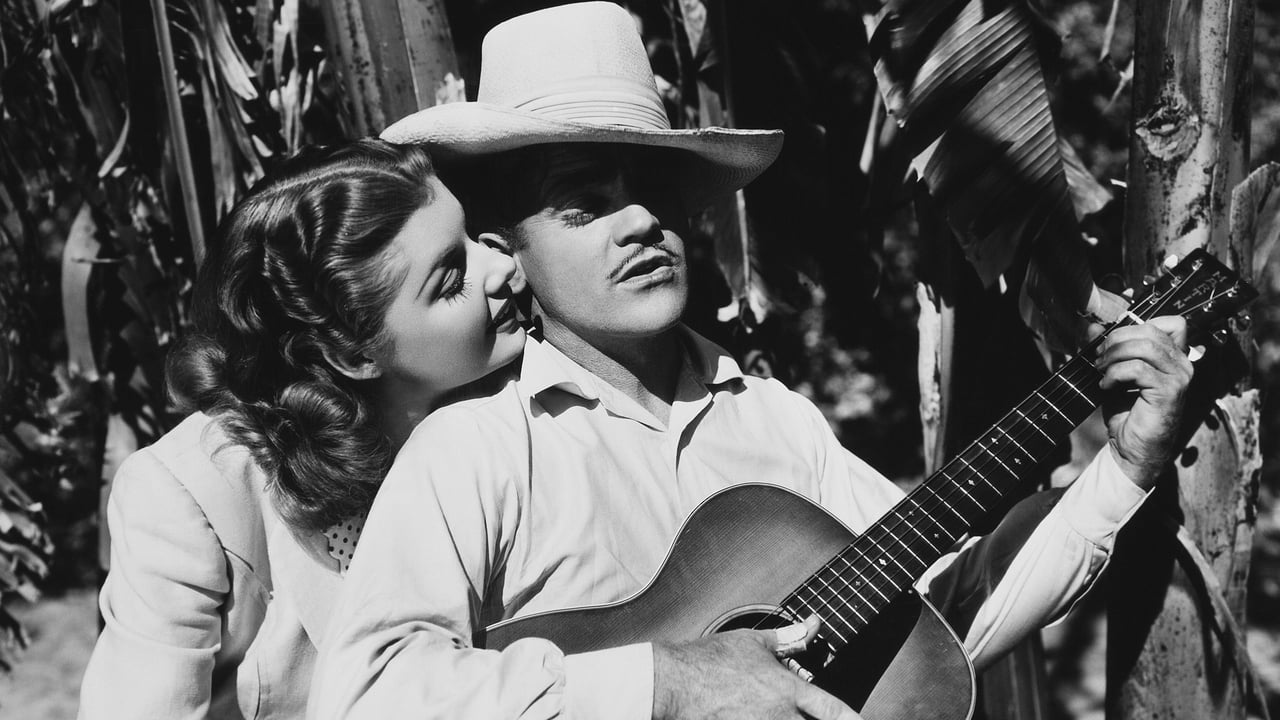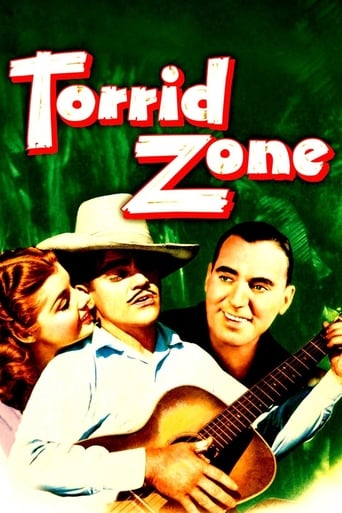

"Mister, the stork that brought you must have been a vulture!" That's how American chanteuse Ann Sheridan refers to South American plantation owner Pat O'Brien when he has her fired and deported in this reunion of the three stars of "Angels With Dirty Faces". James Cagney, with pencil thin mustache, is the nuisance hero that annoys O'Brien but is also someone he can't run the plantation without. Some might find the bandito character played by George Tobias as offensive. He recites common phrases with humorous alterations such as, Now you see the tables are inside out and I save this money for a rainstorm. At times, Tobias sounds like Bela Lugosi as Igor. The best dialog is Sheridan's romantic denials towards Cagney and her verbal sparring with Vinson. O'Brien is a borderline villain, manipulating Cagney, harassing Sheridan and threatening his two aids, . Andy Devine and Grady Sutton every time they take a collect wire from Cagney.As for Devine, it is interesting to note how maliciously Sheridan's character treats him with, such obvious contempt displayed simply because of his appearance. She never even looks him in the face. But his loyalty towards Cagney over his own boss is touching and he delivers each comical line with squeaky voiced glee. A mix of comedy, adventure and romance makes this a sure crowd pleaser.
... View MoreGeorge Tobias is best remembered by my generation for a wonderful comic "cameo-supporting" role he had in the series BEWITCHED, opposite Alice Pearce. He was the immortal Abner Kravitz, neighbor of Samantha and Darren Stevens, who was married to the overly snoopy Gladys Kravitz (Pearce), who was always certain something odd was going on at the Stevens' home. Gladys was right, but she never was able to get her timing correct with Abner (always reading the newspaper, or doing his taxes, or watching television, while she was certain she saw something unearthly across the street). Tobias could play dramatic as well as comic roles, but his timing as a comic performer was wonderful here - with a complete deadpan he always put down his wife, whom he was increasingly convinced was a nut job! This comic ability was put to first rate use by Warner Brothers in his career from the middle 1930s to the 1940s (lest I leave you thinking him just good at comedy, look at his self-sacrificing legionnaire in Burt Lancaster's TEN TALL MEN or his escaped convict in RAWHIDE). In films like THE STRAWBERRY BLOND or YANKEE DOODLE DANDY Tobias enlivened the proceedings like others of the perennial supporting actors crew (like Frank McHugh, Alan Hale Sr., S.Z.Sakall).Tobias did it very realistically. Look at his performance in YANKEE DOODLE DANDY as Mr. Dietz (of Dietz and Goff, the theatrical producers). His matter-of-fact rejection of George. M. Cohan's work the audience knows is wrongheaded, but we also know that 90% of the theater producers in 1903 would have agreed with him. His look of total puzzlement listening to Cohan's tunes (Cagney's singing "Harrigan") makes sense as the tune is not the type of sentimental number about Irishmen that was acceptable on stage in 1903 (Cohan's tune has a feistier, more realistic type involved). When a fed up Cagney dismisses Tobias by saying he has no ear for music, Tobias quietly answers he has a wonderful ear for music. Even if the long term result for Dietz and his partner was wrong, the short term one happened to make sense.I bring this all up because of Tobias' role in TORRID ZONE, as the local revolutionary "bandit" chief, Rosario La Mata. Head of a gang who commit robberies mostly of the local American owned businesses (ironically for this comedy, his two henchmen are the ill-fated George Reeves and the ill-fated Victor Killian), he is usually assisting the locals against greedy gringos and their corrupt minions. This is not approved of by the American owned fruit company that employs Jerome Cowan, Pat 0'Brien, and Jimmy Cagney, but the closer the employee is to the reality of the situation (Cagney is the lowest rung of management here), the more apparent that for all the trouble La Mata is doing he actually is helping his people more than the government is. Notice, Cagney does refer to him as "Rosie", hardly a negative view of the man.The main plot of TORRID ZONE bears comparison to MGM's film (set in French Indo-China) of RED DUST. There to we have Clark Gable and his staff (Tully Marshall and Donald Crisp) on their rubber plantation, awaiting the new manager (Gene Raymond) and his attractive wife (Mary Astor). There a triangle develops between Gable, Astor, and Jean Harlow (who is currently stuck on the plantation). Here it is Cagney's relationship with Cowan's wife Helen Vinson, and his growing attraction to Ann Sheridan. O'Brien (in this, another of his "buddy" films with Cagney) is Cagney's immediate supervisor trying to keep the peace in the business between Cagney and Cowan.It is the business with Tobias' Rosie that lifts it. There is no similar character in RED DUST. His antics, his confrontation at the conclusion with Cagney, O'Brien, Sheridan, and the others, and the nifty way he and Cagney get each other out of the final jam lift the film.Now my question is why was Tobias given such a likable rogue figure in 1940. Well it's obvious that the screenwriters were thinking of someone, a trifle less funny but somewhat admirable in his way. Rosie is a clone (if you will) of August Sandino, the Nicaraguan national hero who was fighting the Somoza Family and their ally (the United Fruit Company) in the late 1920s (see my film review on MARGIE). Sandino was a more ruthless type, but his goal was understandable to his foes. One of them, General Smedley Butler, wrote an interesting book of memoirs about how his Marine Corps commands ended up being used by the Federal Government to help American corporations in Latin America - including Nicaragua. One wishes that Sandino could have seen the film to see some Americans did appreciate his goals. Unfortunately, he was killed in an ambush in 1933.
... View MoreThis was the final film for James Cagney and Pat O'Brien who in my opinion invented the buddy film. O'Brien would be leaving Warner Brothers the following year and the two of them would not get together in another film until Ragtime in 1981 in which they both had small parts.It's a typical fast paced comedy for both of them, they were incapable of doing anything else together. O'Brien slowed down when he was in a clerical collar and Cagney when he was doing a nostalgic film, but together the lines go at light speed. Except when Ann Sheridan is concerned. Director Bill Keighley always slowed the pace for Sheridan because he didn't want anyone to miss some of her tart sayings. She has some of the best lines ever in her career. Typical being when she tells O'Brien that the stork that brought him must have been a vulture. Or when she's constantly one upping Helen Vinson who made a career of playing the other woman.O'Brien is the hardnosed manager of a tropical fruit company and he's in big trouble because a local Sandinista type bandit leader, George Tobias, is wrecking his operations. Another distraction is Ann Sheridan whose redheaded beauty he figures is too much of a distraction to the men where redheads are scarce. Notice how O'Brien tells the local authorities what to do. More truth than humor in that situation.He's desperate enough to hire back his number one troubleshooter James Cagney who gets the job done, but always gets himself in a jackpot where women are concerned. He's taken a fancy to Sheridan and she him.A couple of other reviewers have pointed out the obvious similarities between this and The Front Page. The first film version of that classic play is the one where Pat O'Brien made his screen debut as the ace reporter. However he did it on Broadway in the role of the editor which he's playing here.Perhaps this might be better described as another version of His Girl Friday. I can't say remake because both films came out at the same time. Sheridan comes off the same way as Rosalind Russell does in His Girl Friday, but Keighley also wants to accent her sensuality as well as her sharp tongue. He succeeds admirably because no woman in their previous films quite put off both Cagney and O'Brien the way Sheridan does.The woman sure had oomph.
... View MoreA couple of buddies chasing a buck, and usually a woman, in what we now call the Third World was a staple plot-line of movies from the 1930s on. Such movies were thought to offer a sure-fire recipe for entertainment: a travelogue to sultry and dangerous corners of the globe; romance sauced up with sass; exotic peril; and good ol' man-to-man rivalry. Torrid Zone, directed by the pedestrian William Keighley, follows the recipe but lacks something in the execution that elusive something that elevates the routine into the memorable. Down in Central America, Pat O'Brien plays the irascible operative of a banana-exporting concern (read: the infamous United Fruit Company). Besides shipping ripe but not rotten product to New Orleans, he serves as unofficial proconsul in this far-flung province of the American empire, where his word is, literally, law. (This subversive strand of the script, however, never gets explored.)In addition to sluggish delivery from Plantation #7, O'Brien faces other problems. First, a local `revolutionista' condemned to death has escaped to rejoin rebel forces. Second, an American card-shark and shantoozie (Ann Sheridan) is stirring up trouble (O'Brien flubs his attempt to ship her home like a crate of perishable fruit). Third, his old nemesis James Cagney, former overseer of #7, is back in the country. Cagney takes a shine to Sheridan, who has befriended the revolutionary, who wants back the lands confiscated by O'Brien, who....Barbed and topical dialogue, most of it mouthed throatily by Sheridan, proves to be Torrid Zone's chief attraction. But the needling rivalry between O'Brien and Cagney wears a little thin (as it does in the contemporaneous Road pictures between Hope and Crosby). And Keighley doggedly follows the script from one damn thing to another, so the movie ends up a fast-paced clutter. O'Brien, a good actor who never really grew into a star (though he would shine in Crack-Up and Riffraff a few years later), suffers mostly from an unpleasant part. Cagney, in a Latin-lover mustache and the tropical answer to a 10-gallon hat, comes off as a bit of a bantam rooster. But Sheridan (whom Warner's publicists had dubbed the `Oomph' girl) remains a delight, embodying the pluck, warmth and smarts of that generation of game women who survived the Depression and would help to win the coming War.
... View More